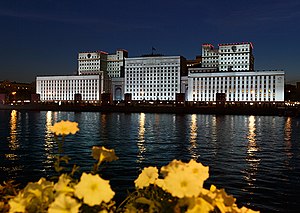Kiravian Security Executive
| Vekturora Reaská | |
 | |
 The Dreaded Ibykia | |
| Collegiate executive overview | |
|---|---|
| Formed | 21XXX |
| Headquarters | The Dreaded Ibykia, Kartika |
| Employees | 247,422 |
| Annual budget | £39.8 billion |
| Collegiate executive executive | |
| Child agencies | |
| Website | wwww.reaska.āri.kr |
The Kiravian Security Executive is the Collegiate executive under which agencies and activities relevant to the security of the Kiravian Federacy but outside the purview of the Defence Executive are organised. The Security Executive's areas of responsibility include internal security and state security, cybersecurity, biosecurity, counterterrorism, border protection, and some aspects of emergency management and counterintelligence. It is a core component of the Federacy's security apparatus.
Profile
The Security Executive has competency in a wide range of areas that are more domestic and non-military in nature, or have been otherwise assessed to be better-handled outside the Kiravian Armed Forces and the Defence Executive. These include matters that primarily involve Kiravian civilians (where the use of military assets is generally considered illegitimate), security tasks that are simply non-military in nature, and those that involve monitoring of the Kiravian government itself (where use of military assets would violate Article X of the Fundamental Statute).
Nonetheless, the Security Executive's mission profile does have considerable overlap with that of the Defence Executive (particularly in intelligence), as well as with federal and state law enforcement agencies. As such, it has come to embrace a coördinating- and information-sharing role with regard to multi-agency projects. The Chief Security Executive is an ex officio member of the Strategon and is a key participant in the Federacy's highest-level security decisions. It also maintains liaisons with allied agencies at the sub-cabinet level.
Histocially, the Security Executive was also responsible for defending the régime against internal threats, but today its state security functions are mostly limited to the physical protection of high-profile government officials and offices, as well as the digital protection of government networks and sensitive data.
History
The Security Executive was created by Prime Executive Atoverus Verogan in the aftermath of the Colour Wars, the most extensive and devastating internal conflict to affect Kiravia since the Republican Revolution. Its original purpose was to counter the activities of the various partisan and ideological militias that had either refused to demobilise after the Colour Wars or formed immediately afterward in opposition to the terms of the Mérosar Compromise. In previous times, most episodes of domestic unrest in Kiravia were sufficiently small in scale and localised in scope that they could be dealt with by police, the official militias of individual states or, at worst, by small deployments of federal troops. However, the domestic situation following the Colour Wars presented new challenges in that the anti-Compromise militant groups often operated across state lines (limiting the ability of state governments to combat them) and had continued the style of guerilla warfare that they had adopted in the later stages of the Colour War by blending in with the civilian population and engaging in more sporadic, lower-intensity violence (limiting the degree to which a conventional military solution would be effective). Thus, Verogan and his supporters in the Stanora, most of whom were from [PARTIES], saw fit to create an agency that would have nationwide jurisdiction, cabinet-level attention, and a strategy that would combine more fine-comb methods from law enforcement and military intelligence to root out the enemy. In this respect, the foundation of the Security Executive is considered an important early development in the fields of counterinsurgency and a precursor of later approaches to fourth generation warfare. The first agency organised under the Security Executive was the Interior Ranger Corps. The Interior Rangers were mostly recruited from Kiravian Army veterans belonging to or having ties with the Coscivan, Celtic, and Urom ethnosocial communities in areas where paramilitary activity was strong. This enabled the Rangers to more easily gain the trust of local civilians and enlist their help in locating, sabotaging, and sometimes even infiltrating the anti-Compromise paramilitaries, as well as to turn public opinion against them in certain villages where they had previously enjoyed some measure of support.
After the rise of the Kirosocialist government amid intense opposition from many sectors of Kiravian society, the Security Executive's mission profile turned towards state security and ensuring the survival of the régime in the face of domestic threats. Over the course of the Kirosocialist period, the Security Executive saw large increases in jurisdiction, authority, personnel, and funding in order to counter the proliferation of anti-Kirosocialist movements both among the population at large and within the state and federal governments. Most of the Security Executive's spending, personnel, and activity during Kirosocialism was concentrated in the Republic Security Department. The RSD undertook a wide range of surveillance operations targeted at civil society actors and government officials who were considered unreliable by the Kirosocialist Party. It was responsible for the arrests of hundreds of anti-Kirosocialist dissidents, the suppression of opposition publications, and political censorship of universities, churches, and other institutions. A major concern for the régime was intense and widespread dissent in the Kiravian military, which caused Kirosocialist leaders to live in constant fear of an armed coup. The RSD conducted a deep infiltration of the Kiravian officer corps and worked within the military's chain of command to ensure that the régimes strongest opponents were gradually sidelined and passed over for promotions.
The Security Executive was subject to major reforms after the fall of Kirosocialism. The last Kirosocialist Prime Executive, Aśtukéter, curtailed the activities of the RSD and pardoned political prisoners in an unsuccessful attempt to revive popular support, and his Shaftonist-Republican successor, Cólsylva, abolished the RSD and declassified an estimated 96% of its archives. Its state security responsibilities, now greatly attenuated, were transferred to the new Federal Security Bureau, a smaller and less-powerful but nonetheless highly secretive body. Subsequent Prime Executives continued to restructure the Security Executive and the agencies under its umbrella to fit the security environment of the contemporary world. This ongoing process has included capacity-building with regards to new threats such as bioterrorism, cybersecurity, and hijackings; updating command-and-control protocols to take advantage of new technologies, and developing new contingency plans to handle a wider range of terrorism-, military-, and engineering-related disasters.
Subordinate Agencies
- Domestic Security Agency - The largest agency under the Security Executive, the DSA is charged with monitoring and addressing domestic threats to Kiravian security and the constitutional order. Its investigations focus mainly on organised groups (whether overt or clandestine) with political or communal motivations, and make use of various tactics, including open-source monitoring, infiltrations, wiretaps, and financial intelligence. It works closely with the Federal Police.
- Secret Service - Counterintelligence unit with agents and assets embedded throughout the federal government, charged with detecting spies and moles. It is functionally the human intelligence counterpart of the Virtual Security Agency.
- Virtual Security Agency - The Federacy's leading cybersecurity body, the VSA is directly responsible for protecting the government's highest-value non-military computer systems, networks, and files, as well as other vital electronic systems such as those in nuclear power plants and financial exchanges. In addition to its direct responsibilities, it tests and reviews the data security measures of other government bodies, for which it sets standards and provides technical assistance.
- Liminal Integrity Service - Responsible for border security and immigration and customs enforcement at ports of entry to Kiravian territory.
- Kiravian Biosecurity Agency - Responsible for securing the Kiravian population, environment, agricultural sector, and food supply against biological warfare and acts of bioterrorism.
- Federal Protective Service - Responsible for the physical security of high-profile federal officials and office buildings, as well as other persons or locations as assigned by the Prime Executive. The Stanora and its Delegates are protected by the Stanoral Guard, and several Cabinet officials have security details provided by armed units under the purview of their own offices.
- Federal Security Bureau - Officially responsible for "executive functions in matters related to the survival of the Republic," the FSB is an élite and highly secretive body, about which little information is publicly available. It is thought to be, either wholly or principally, an internal intelligence unit aimed at preventing coups d'état.
- Infrastructure Office - The SE Infrastructure Office is directly responsible for the protection of certain federally-owned infrastructure (such as the Interlacunal Canal), working with state governments to develop security plans and systems for other infrastructure, and working with Kiravian Civil Defence on infrastructure-related matters in emergency management.
- Kiravian Civil Defence - Originally created to prepare the Federacy's civil defence systems in case of a nuclear or other WMD attack, KCD is now also responsible for most federal emergency management activities, dealing primarily with natural and engineering disasters.
Criticism and Controversy
As a security agency that combines many of the methods and practices of the military and military intelligence with a focus that is primarily domestic, the Security Executive, particularly in its state security capacities, has elicited criticism from civil society actors both within Kiravia and internationally. Along with the Defence Executive and the independent intelligence agencies, the Security Executive is thought to shelter a large portion of the Federacy's deep state, creating concerns for some about a lack of transparency, public accountability, and relationship to elected officials.
Allegations of Political Repression
The Security Executive and agencies under its direction, especially the DSA, are frequently accused of being instruments of political repression. The Special Tribunal on Government Accountability, created to investigate alleged violations of the Fundamental Statute and Statute of Liberties by the Kirosocialist régime, found that the Republic Security Directorate had violated the constitutional rights of over four thousand citizens through arbitrary and indefinite detention; unlawful entries, surveillance, and confiscations; press suppression, and voter intimidation. Nineteen senior Security Executive officials and 240 subordinate agents have been convicted by the Special Tribunal to date, and new charges continue to be filed decades after the end of Kirosocialism.
More recently, the Candrin administration has been accused of using the Domestic Security Agency to crack down on pro-Western and progressive liberal activists. Progressive critics allege that the DSA has overstepped its jurisdiction by applying overly broad definitions of 'anti-Coscivian extremism' and 'foreign-backed antigovernment operative' to justify actions against nonviolent civil society actors promoting Westernisation. Many of these allegations relate to the suppression of pro-Western students' societies and the shutdown of a number of periodicals and web domains in the wake of the 2027 Communard Protests.